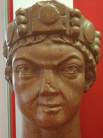Who was Justinian? Justinian (483-565) rose from Gothic peasantry to become Emperor of Byzantium due to his dazzling oratory. He married the actress, Theodora, who reigned as a forceful queen. He restored much of the original Roman Empire. When Justinian proposed to reconquer the Roman Empire, Constantinople revolted. Even the elite forces of the military genius Belisarius were at first unable to quell the revolt. Holed up in the palace, all of Justinian’s advisors counseled retreat by sea. All but the Empress Theodora: “In a crisis like the present we have no time to argue whether a woman’s place is the home, and whether she ought to be meek and modest in the presence of the lords of creation. We have got to get a move on quick. My opinion is that this is no time for flight – not even if it is the safest course. Every one who has been born has to die; but it does not follow that every one who had been made an emperor has to get off his throne. May the day never come when I do! If you want to make yourself safe, emperor, nothing stops you. There is the sea over there, and boats on it and money to pay your way….As for me, I stand by the old saying, that the best winding sheet is a purple one.” Chastised, Justinian rallied his troops to victory.
Historical context. Not all of Rome fell to Alaric in 410 A.D. The Eastern Byzantine empire, founded when Constantine moved his capitol to Constantinople (330 A.D.), survived. It exercised a potent influence in Europe for over 1,000 years. The “City of Gold”, derived its original name from the Greek colonizer Byzas, who founded it in 667 B.C. The Byzantine Empire represented a mix of Greek culture, Roman central rule and Christianity. The emperor presided over both church and state. Militarily Justinian’s rein re-established Rome in the Mediterranean. He recovered all but Northern Spain and Gaul from the barbarians. However, his tax policies and building projects were ruinous. The latter included the famous Hagia Sophia (Church of the Holy Wisdom), which became a mosque in 1453 and is now a museum.
Summary of Justinian’s teaching. In spite of his many failings, Justinian appointed 17 learned civilians to codify civil law for the Eastern Empire. The Corpus Juris Civilis (534), gave lip service to God. It played a big role in the infrastructure of the powerful Byzantine Empire, which endured for over a millennium. And it came to provide the backbone for the legal structure of all Europe. The only exception was Britain, which traced the origin of its common law as far back as Alfred the Great.
Implications for subsequent history. After a long period lying dormant in the West, the Justinian Code was found in an Italian library during the Papal Revolution (about 1080). A new science of legal scholasticism arose in the law school at Bologna. It used the ancient Greek dialectic to interpret and order the Roman code. Student glossings (interpretations) and disputatios (debates) were added to the text. Together they provided the origin of modern Western legal science and the first lawyers (Law & Revolution, pp. 120-164). The result has been a radical, separation of God and state that has endured to the present. This was made worse by the “Papal Revolution”, in which the church demanded freedom from the state.
Thus, the Justinian Code — in its original and glossated forms — is corrupted by natural law. Natural law was embraced as the ally and support of Revelation. However, it proved to be the “enemy within the gates.” It replaced the divine law of liberty with tyrannical statist law. Natural law is defined as enduring moral precept, supposed to be seen in nature. It is therefore common to all men.
Biblical law is generally negative (Thou shalt not). It is designed to contain man’s sinful nature. In contrast, humanistic positive law goes beyond the biblical “thou shalt not.” It tries to provide all kind of positive benefits. Thus, it displaces the charity of God and the church.
Biblical analysis. Christians never seem to learn that only the law of the Lord is “the perfect law of liberty” (James 1:25). We almost always ignore God’s “product warning label”: accept no substitutes. They always promise much, but deliver slavery. The Justinian Code, was based on natural law reasoning. Following this example, modern law codes have long since abandoned the Bible as the source of law. However, this is not a permanent condition. Isaiah foretells the day when “many people shall go and say, Come ye, and let us go up to the mountain of the Lord, to the house of the God of Jacob; and he will teach us of his ways…for out of Zion shall go forth the law…And he shall judge among the nations and shall rebuke many people: and they shall beat their swords into plowshares….” (Isa. 2:3,4).
Corrective or prescriptive actions. As Christians move back into the arena of law and politics, they face a daunting task. The law books must be purged of their humanistic roots and rewritten in terms of the Bible. This is part of the task of “discipling the nations” (Matt. 28:19, 20). We are promised that God will bless us with total victory.


